Academy in Context: Previous Years
Sub Navigation
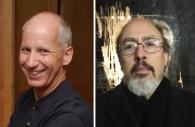 Bjorn Sandstede and Roger Blumberg are the featured speakers for the Academy in Context dinner-seminar on Bias and Transparency in Contemporary Data Science. Sandstede is a Professor of Applied Mathematics and Director of the Data Science Initiative; Blumberg is an Adjunct Lecturer in Data Science.
Bjorn Sandstede and Roger Blumberg are the featured speakers for the Academy in Context dinner-seminar on Bias and Transparency in Contemporary Data Science. Sandstede is a Professor of Applied Mathematics and Director of the Data Science Initiative; Blumberg is an Adjunct Lecturer in Data Science.
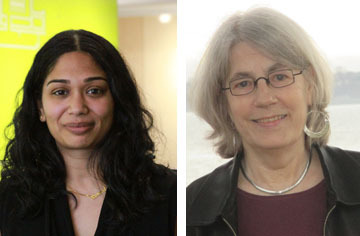 Sohini Ramachandran and Lundy Braun are the featured speakers of the February 28, 2018, Academy in Context dinner-seminar entitled, "Approaches to Studying Race and Health."
Sohini Ramachandran and Lundy Braun are the featured speakers of the February 28, 2018, Academy in Context dinner-seminar entitled, "Approaches to Studying Race and Health."
Ramachandran will discuss how current genomic studies of disease focus on homogeneous, and usually European, patient data. She will explain how expanding study designs to include diverse samples and individuals of mixed ancestry can yield new insights into the genomic architecture of disease.
Braun will describe how the spirometer, a machine that measures lung function, routinely "corrects" for race in clinical and research settings. Her talk will track the history of this practice in medicine, drawing on archival and scientific evidence.
Ramachandran is an Associate Professor of Ecology and Evolutionary Biology and Computer Science and Director for the Center for Computational Molecular Biology. Braun is a Professor of Medical Science and Africana Studies.
This Academy in Context dinner-seminar is part of a series intended to foster discussion of ethical issues among graduate students across the disciplines. The purpose of the program is not to draw definitive conclusions or identify "right" answers, but rather to explore the ethical challenges that are raised from a variety of perspectives.
The event is open to graduate students and is hosted by the Dean of the Graduate School.
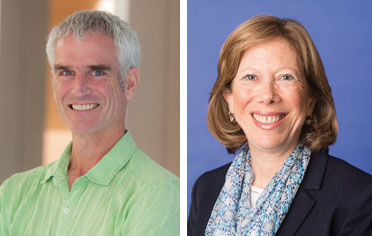 John "Jack" Mustard and Deborah Gordon are the featured speakers of the February 15, 2017, Academy in Context dinner-seminar entitled, “Climate Change: Perspectives on Challenges in Two Key Sectors.”
John "Jack" Mustard and Deborah Gordon are the featured speakers of the February 15, 2017, Academy in Context dinner-seminar entitled, “Climate Change: Perspectives on Challenges in Two Key Sectors.”
Mustard, a Brown University Professor of Earth, Environmental, and Planetary Sciences and Professor of Environmental Studies, will focus on how agricultural systems will adapt to changing climate to serve a growing population's demands for food and fuel. Deborah Gordon, Director of the Energy and Climate Program at the Carnegie Endowment for International Peace and Senior Fellow at the Watson Institute for International and Public Affairs, will speak about the complexities and challenges affecting climate change due to the significant diversity in global oils’ greenhouse gas emissions. These two sectors—agriculture and oil—underscore the need for honesty and transparency, even when existing rules are not requiring it, the speakers say.
This Academy in Context dinner-seminar is part of a series intended to foster discussion of ethical issues among graduate students across the disciplines. The purpose of the program is not to draw definitive conclusions or identify "right" answers, but rather to explore the ethical challenges that are raised from a variety of perspectives.
The event is open to graduate students and is hosted by the Dean of the Graduate School.
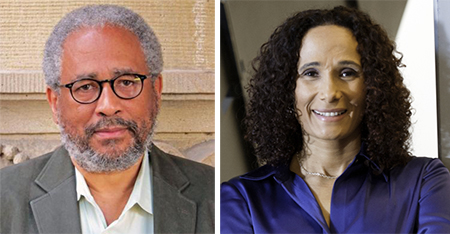 Anthony Bogues and Tricia Rose spoke at the Fall 2016 Academy in Context dinner-seminar entitled “Race and Knowledge.” Bogues, the Asa Messer Professor of Humanities and Critical Theory and the Director of the Center for the Study of Slavery & Justice, focused on the hierarchies of knowledge production. Rose, who is Professor of Africana Studies and the Director of the Center for the Study of Race and Ethnicity in America at Brown, focused on research on race under conditions of racial inequality.
Anthony Bogues and Tricia Rose spoke at the Fall 2016 Academy in Context dinner-seminar entitled “Race and Knowledge.” Bogues, the Asa Messer Professor of Humanities and Critical Theory and the Director of the Center for the Study of Slavery & Justice, focused on the hierarchies of knowledge production. Rose, who is Professor of Africana Studies and the Director of the Center for the Study of Race and Ethnicity in America at Brown, focused on research on race under conditions of racial inequality.
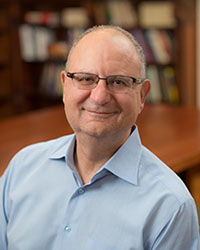 Beshara Doumani spoke at the February 25 Academy in Context dinner-seminar, in a talk entitled, "Torn Asunder: Displacement in the Making and Unmaking of the Modern Middle East." He is the Joukowsky Family Professor of Modern Middle East History, Professor of History, and Director of Middle East Studies at Brown University. He presented and led a discussion on the Middle East state system, the massive displacements in the wake of imploding states in the Middle East, the impact on Europe and global politics, and the larger question of displacement in the making of the modern world.
Beshara Doumani spoke at the February 25 Academy in Context dinner-seminar, in a talk entitled, "Torn Asunder: Displacement in the Making and Unmaking of the Modern Middle East." He is the Joukowsky Family Professor of Modern Middle East History, Professor of History, and Director of Middle East Studies at Brown University. He presented and led a discussion on the Middle East state system, the massive displacements in the wake of imploding states in the Middle East, the impact on Europe and global politics, and the larger question of displacement in the making of the modern world.
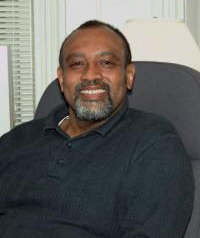 Glenn C. Loury spoke at the October 21 Academy in Context dinner-seminar, with a talk called: "Black Lives Matter: A New Civil Rights Movement?" He is Merton P. Stoltz Professor of the Social Sciences and Professor of Economics at Brown University.
Glenn C. Loury spoke at the October 21 Academy in Context dinner-seminar, with a talk called: "Black Lives Matter: A New Civil Rights Movement?" He is Merton P. Stoltz Professor of the Social Sciences and Professor of Economics at Brown University.
He presented and lead a discussion on what he sees as shortcomings in racial-identity politics in the U.S., a host of persistent disparities requiring urgent attention, and the potential for a new direction in progressive politics.
“Black Lives Matter has, in my opinion, gotten off on the wrong foot and is barking up the wrong tree,” Prof. Loury says. “Serious political activists need to get off the soapboxes already, and start concentrating on what really matters to the lives of African Americans.” A class-struggle politics offers hope, he says: Building effective coalitions among working and disadvantage Americans could push the policy-making process in a more progressive direction.
 Bertram Malle, Professor of Cognitive, Linguistic, and Psychological Sciences and co-leader of Brown’s Humanity-Centered Robotics Initiative (HCRI), introduced a provocative and fascinating topic: the likely future of having robots in our lives. If technology is advancing as fast as some predict, then within a few decades, robots will participate in classroom teaching, healthcare, and law enforcement. They will be co-workers, social companions, and nannies. But what capacities make these robots psychologically safe—helpful to people and not destructive? His talk was entitled "Raising Robots to be Social, Moral Agents: Can We? Should We?" Malle sketched a suite of social and moral capacities that humans expect of one another and that they are likely to expect of robots as well. The key questions, then, are: Can we build robots with these capacities? And should we?
Bertram Malle, Professor of Cognitive, Linguistic, and Psychological Sciences and co-leader of Brown’s Humanity-Centered Robotics Initiative (HCRI), introduced a provocative and fascinating topic: the likely future of having robots in our lives. If technology is advancing as fast as some predict, then within a few decades, robots will participate in classroom teaching, healthcare, and law enforcement. They will be co-workers, social companions, and nannies. But what capacities make these robots psychologically safe—helpful to people and not destructive? His talk was entitled "Raising Robots to be Social, Moral Agents: Can We? Should We?" Malle sketched a suite of social and moral capacities that humans expect of one another and that they are likely to expect of robots as well. The key questions, then, are: Can we build robots with these capacities? And should we?
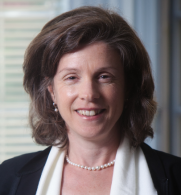 Maud S. Mandel, Professor of History and Judaic Studies and Dean of the College, was the speaker for the October 29 Academy in Context dinner-seminar.
Maud S. Mandel, Professor of History and Judaic Studies and Dean of the College, was the speaker for the October 29 Academy in Context dinner-seminar.
She spoke on the research she conducted for her most recent book, Muslims and Jews in France: History of a Conflict (Princeton University Press, 2014). Her talk focused on the ethical and political choices confronting scholars working in the field of contemporary history. In particular, she focused on the way rapidly shifting political landscapes shape historical narratives and the scholar's role as intermediary in this conversation.
 Richard Locke, Director of the Watson Institute for International Studies and Professor of Political Science, was the speaker for the February 11 Academy in Context dinner-seminar, "Promoting Labor Rights in the Global Economy."
Richard Locke, Director of the Watson Institute for International Studies and Professor of Political Science, was the speaker for the February 11 Academy in Context dinner-seminar, "Promoting Labor Rights in the Global Economy."
He presented and led a discussion on his globalization and labor standards project. Locke discussed how he worked with leading global corporations like Nike, Hewlett Packard, Coca Cola and Apple to study working conditions in their supply chains and focus on both the complexities of negotiating access to sensitive internal company data and of convincing companies to change their practices as a result of the research findings.
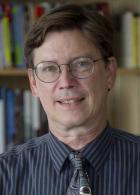 Robert Preucel, director of the Haffenreffer Museum of Anthropology, was the speaker for the October 10 Academy in Context dinner-seminar, entitled “Can Culture be Owned?: Politics, NAGPRA, and The National Museum of the American Indian.”
Robert Preucel, director of the Haffenreffer Museum of Anthropology, was the speaker for the October 10 Academy in Context dinner-seminar, entitled “Can Culture be Owned?: Politics, NAGPRA, and The National Museum of the American Indian.”
Preucel led a discussion on repatriation as a cultural movement with a focus on the Native American Graves Protection and Repatriation Act (NAGPRA). This act, passed into law in 1990, provides a way for federally recognized tribes to repatriate ancestral human remains and certain categories of objects, including sacred objects and objects of cultural patrimony. He explored how the circulation of objects in different social contexts produces new meanings and practices.
Preucel comes to Brown from the University of Pennsylvania where he served as chair of the Department of Anthropology and curator-in-charge of the American section of the Penn Museum of Archaeology and Anthropology. He is well-known for his contributions to archaeological theory, including Contemporary Archaeology in Theory (Blackwell, 1996) which is widely used as a textbook. Working towards one of his goals, to make the Haffenreffer's collections more accessible to students, faculty, and the public, he has already established a faculty fellows program that awards a stipend to faculty for using the museum’s collections for teaching.
 Christina H. Paxson, the nineteenth president of Brown University, was the speaker for the April 11 Academy in Context dinner-seminar, called: "Public Policy Responses to HIV in Africa."
Christina H. Paxson, the nineteenth president of Brown University, was the speaker for the April 11 Academy in Context dinner-seminar, called: "Public Policy Responses to HIV in Africa."
She came to Brown from Princeton University, where she was dean of the Woodrow Wilson School of International and Public Affairs and the Hughes Rogers Professor of Economics and Public Affairs. Paxson's research focuses on the relationship of economic factors to health and welfare over the life course, particularly on the health and welfare of children. In 2000, she founded the Center for Health and Wellbeing, an interdisciplinary research center in the Woodrow Wilson School.
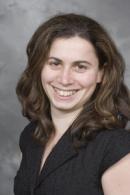 Anna Lysyanskaya, a pioneer in online authentication that safeguards privacy, was the speaker for the November 8 Academy in Context dinner-seminar, called: “They Don't Need to Know Your Date of Birth – or – Taking Charge of Your Personal Data.”
Anna Lysyanskaya, a pioneer in online authentication that safeguards privacy, was the speaker for the November 8 Academy in Context dinner-seminar, called: “They Don't Need to Know Your Date of Birth – or – Taking Charge of Your Personal Data.”
Drawing from her research and experience in the technology industry, she looked at how you can prove you are authorized to do what you need to do. How can a movie site know that you are, say, over 18? How can a newspaper verify that you are a paid subscriber? In this talk, she discussed these issues and, more interestingly, show that a user can prove that she is authorized without revealing who she is or anything else about herself. She also discussed, more broadly, methods for ensuring that personal data stays private.
This talk was for a general audience, no prior knowledge of computer science was assumed. After her talk, she led a discussion about the intellectual and privacy issues entailed in this area of research.
Lysyanskaya, an Associate Professor of Computer Science at Brown, received the Ph.D. in Computer Science and Electrical Engineering from MIT in 2002. She came to Brown in 2002 and has since received an NSF CAREER award, numerous other NSF grants, and a Sloan Research Fellowship. MIT Technology Review Magazine named her to its 2007 list of "35 Innovators under 35." Her work on authorization was incorporated into the Trusted Computing Group's industrial standard and served as the theoretical foundation for IBM Zurich's Idemix project.
 Catherine Lutz, co-director of the Costs of War research project, spoke at the Academy in Context dinner-seminar on February 28 on "Research, Media, and Politics in the Study of War."
Catherine Lutz, co-director of the Costs of War research project, spoke at the Academy in Context dinner-seminar on February 28 on "Research, Media, and Politics in the Study of War."
Lutz is the Thomas J. Watson Jr. Family Professor of Anthropology and International Studies and holds a joint appointment with the Department of Anthropology, which she chairs.
At the Graduate School dinner-seminar, Lutz presented and led a discussion on the Costs of War study. She covered how she organized the large, collaborative project, the impulses behind it, and the best practices and pitfalls of conducting and disseminating research whose primary intention is to inform public debate about a contentious issue.
In the Costs of War project, Lutz, along with more than 20 economists, anthropologist, attorneys, political scientists and humanitarian personnel have examined the direct and indirect cost of the military response to the 9/11 attacks. It is the first comprehensive analysis of its kind that surveys all of the U.S., coalition, and civilian casualties. It also takes into account hidden costs such as interest on war-related debt and veterans' benefits.
John P. Donoghue, a pioneer researcher in brain-computer interface, spoke at the October 26 Academy in Context dinner-seminar on "Neuroethics: ‘Terminator’ or Luke Skywalker?"
A Brown University neuroscientist and Department of Veterans Affairs researcher, John Donoghue’s work has led to the development of an interface that links the human brain directly to digital devices such as computers. Earlier this year, he was elected to the American Academy of Arts and Sciences. He is Henry Merritt Wriston Professor and director of the Brown Institute for Brain Science.
At the Graduate School dinner-seminar, he led a discussion on the idea of plugging into the brain. Once the domain of “The Matrix”, it is now a reality. But unlike the movie character Neo, brain implants are being used to help people with brain disorders and injured nervous systems. Donoghue described the status of work with brain interfaces and foster an open discussion of the ethical implications and challenges for patients, for scientists, and for society as we begin to merge mind and machines.
He draws on his experience working with a large group of faculty and students to develop the BrainGate brain-computer interface. The investigational system is a combination of hardware and software that uses tiny implanted electrodes to detect electrical signals produced by neurons in the brain that control movement. The system decodes those signals and translates them into digital instructions to give people with paralysis control of external devices such as computers, robotic assistive devices, or wheelchairs.
Dr. Stephen Behnke, director of ethics at the American Psychological Association, spoke at a March 10, 2011 dinner-seminar for graduate students on “Religion and Sexual Orientation: When Justice and Peace Shall Kiss, or Clashing Cymbals?”
The Ethical Principles of Psychologists and Code of Conduct (2002, amended 2010) states that psychologists do not engage in discrimination. Yet, what happens when two aspects of diversity, such as sexual orientation and religion, are in tension? This evening program explored how aspects of diversity may raise challenging ethical dilemmas for psychologists and other professionals, and will examined how the law has addressed these tensions in the context of psychology training. A case vignette was be offered for discussion.
Lynn Pasquerella, a prominent ethicist who received her PhD from Brown University in 1985, spoke shortly after being named president-elect of Mount Holyoke College. The dinner-seminar topic, “Overcoming Moral Distress,” explored ethical decision making in hospital and other institutional settings. What should a person do if organizational and institutional cultures conflict with what seems to be the right course of action? Come, contribute and consider approaches to overcoming the phenomenon of moral distress.
The Graduate School was delighted to present James A. Morone, Chair and Professor of Political Science at Brown University, on a timely topic: why does health care reform create such a political frenzy? Jim, who has told parts of this story on NPR's Morning Edition, Science Friday, Market Place as well as on The Newshour with Jim Lehrer and CBS Sunday Morning, looked at why health care reform is so difficult in the U.S. and what the frenzy tells us about American politics and culture. This dinner-seminar gave graduate students the opportunity to engage with him on the ethics of health care reform and the past, the present and the future of American health care.
The Graduate School welcomed Stanley Fish, a public intellectual known for his New York Times blog, “Think Again.” He is the Davidson-Kahn Distinguished University Professor and a Professor of Law at Florida International University. He is dean emeritus at the College of Liberal Arts and Sciences, University of Illinois, Chicago, and has taught at the University of California at Berkeley, Johns Hopkins University, and Duke University. Author of 10 books, his most recent one, “Save the World on Your Own Time,” is hot off the press, published by Oxford University Press.
In his Academy in Context talk, Mr. Fish explored the relationship between theoretical perspectives, especially postmodern ones, and questions of truth, fact and evidence.
Dr. Moira Gunn is the host of “Tech Nation” and “BioTech Nation” on NPR Talk, as well as the program director for Information Systems Programs at the University of San Francisco. A former NASA scientist and engineer, she was the first woman to earn a Ph.D. in Mechanical Engineering at Purdue University. Gunn is the author of “Welcome to BioTech Nation: My Unexpected Odyssey into the Land of Small Molecules, Lean Genes, and Big Ideas.”
Dr. Moira Gunn discussed a variety of ethical dilemmas presented by emerging biotech. These issues present themselves when society must choose between difficult choices: between hunger and genetically-modified food, between food on the table and bio-fuel in the tank, between traditional agriculture and environmentally less-demanding GM crops, between genetically-based medical treatments for the living and the rights of embryos, between large DNA databases and the rights of the individual. Gunn presented these dilemmas in terms of the actual biotechnology and the political, economic and social aspects which must be considered, while taking into consideration the nature of innovation and the present-day speed of technological change.
Bernard Reginster is a professor of Philosophy at Brown. His research focuses on issues in ethics, moral psychology, and philosophy of mind in nineteenth-century German and twentieth-century French thought, as well as in contemporary psychoanalytical theory. He is particularly interested in the ethical implications of a secularized world view and in the relations between subjectivity and intersubjectivity. He has published many articles on these themes and his most recent book, The Affirmation of Life. Nietzsche on Overcoming Nihilism, was published by Harvard University Press in 2006.
Reginster discussed the notion of academic responsibility: What sorts of responsibilities do academics have? To whom? Is the choice of a research topic, and the manner in which research is conducted, answerable only to one’s own discipline, to other disciplines, to one’s society, or even to humankind? In what ways are such choices answerable to these constituencies? In other words, what are appropriate justifications for the various forms of academic inquiry?
Randy Cohen’s first professional work was writing humor pieces, essays, and stories for newspapers and magazines (The New Yorker, Harpers, the Atlantic, Young Love Comics). His first television work was writing for "Late Night With David Letterman" for which he won three Emmy awards. His fourth Emmy was for his work on "TV Nation." (Cohen received a fifth Emmy as a result of a clerical error and kept it.) Currently he writes "The Ethicist" a weekly column for the New York Times Magazine syndicated throughout the U.S. and Canada. He is a regular contributor to Weekend All Things Considered on National Public Radio.
Rebecca Dresser is the Daniel Noyes Kirby Professor of Law and Professor of Ethics in Medicine at Washington University in St. Louis. Since 1983, she has taught medical and law students about legal and ethical issues in end-of-life care, biomedical research, genetics, assisted reproduction, and related topics. Dresser served on the ethics committee of the American Society for Reproductive Medicine and the advisory council of the National Institute on Deafness and Other Communication Disorders, a division of the National Institutes of Health. She is a fellow of the Hastings Center and one of the "At Law" columnists for the Hastings Center Report, the oldest and most widely read U.S. bioethics journal. In 2001 Dresser published When Science Offers Salvation: Patient Advocacy and Research Ethics. She is also co-author of The Human Use of Animals: Case Studies in Ethical Choice and "Bioethics and Law: Cases, Materials and Problems. Since 2002, she has been a member of the President’s Council on Bioethics.
Martha C. Nussbaum is the Ernst Freund Distinguished Service Professor of Law and Ethics at the University of Chicago. A former Brown faculty member, Nussbaum received her B.A. from New York University and her M.A. and Ph.D. from Harvard. She has also taught at Harvard and Oxford universities. A philosopher whose work focuses on ancient Greek philosophy, contemporary moral and political philosophy, feminism, and the connections between philosophy and literature Nussbaum's 1985 book The Fragility of Goodness was particularly influential and made her a well-known figure throughout the humanities. Her other books include Love's Knowledge (1990), The Quality of Life (1993, with Amartya Sen), Cultivating Humanity: A Classical Defense of Reform in Liberal Education (1997), Sex and Social Justice (1998), Women and Human Development: The Capabilities Approach (2000), Upheavals of Thought: The Intelligence of Emotions (2001), Hiding From Humanity: Disgust, Shame, and the Law (2004), Frontiers of Justice: Disability, Nationality, Species Membership (2005), and The Clash Within: Democracy, Religious Violence, and India's Future (2006).
Robert L. Park is Professor of Physics and former chair of the Department of Physics at the University of Maryland. Prof. Park received his Ph.D. in physics from Brown, where he was the Edgar Lewis Marston fellow, in 1964. Prior to coming to Brown, his study of law at the University of Texas was interrupted by the Korean War, during which he served as an electronics officer in the U.S. Air Force. Following the war, he switched to physics and graduated Phi Beta Kappa with high honors. A Fellow of the American Physical Society, the American Society for the Advancement of Science and the Committee for Skeptical Inquiry, Park is author of more than a hundred papers on the structure of crystal surfaces. For more than twenty years he has posted a provocative weekly column from Washington, D.C., on science issues at http://bobpark.physics.umd.edu. Park is a prolific op-ed contributor for the New York Times and Washington Post and is a frequent commentator on television news. He is the author of Voodoo Science: the Road from Foolishness to Fraud.
(Students are encouraged to visit the Slavery and Justice website where a copy of the report can be downloaded, along with background and supplementary information: http://brown.edu/slaveryjustice.)
James Campbell is an associate professor of American Civilization, Africana Studies, and History at Brown. He is the author of two books, Songs of Zion: The African Methodist Episcopal Church in the United States and South Africa and the recently published Middle Passages: African American Journeys to Africa, 1787-2005. He is also co-editor of a forthcoming anthology, Race, Nation, and Empire in American History, slated to appear in 2007. Campbell has received numerous fellowships and awards, including the Carl Sandburg Literary Prize for Non-fiction and the Organization of American Historians' Frederick Jackson Turner Prize. Before coming to Brown, he taught at Northwestern University and at the University of the Witwatersrand in Johannesburg, South Africa.
Susan E. Alcock is the inaugural Director of the new Artemis A. W. Joukowsky and Martha Sharp Joukowsky Institute for Archaeology and the Ancient World at Brown. Her current research interests include the Hellenistic and Roman eastern Mediterranean and southern Caucasus, landscape archaeology, and the archaeology of memory and of imperialism. Dr. Alcock has recently begun fieldwork in southern Armenia, as co-director of the Vorotan Project. She is a 2001 recipient of a MacArthur Fellowship from the John D. and Catherine T. MacArthur Foundation. Her books, solo authored and edited, include: Archaeologies of the Greek Past: Landscape, Monuments and Memory (2001), which won the Spiro Kostof Award from the Society of Architectural Historians; Pausanias: Travel and Memory in Roman Greece (2001); Empires : Perspectives from History and Archaeology (2001); The Archaeology of Memory (2003); and Side-by-Side Survey: Comparative Regional Analysis in the Mediterranean Region (2004).
Hima B. Mallampati is a graduate student in the Interdepartmental Program in Classical Art and Archaeology at the University of Michigan. She earned a J.D. from Stanford Law School in 2001 and a B.A. in Art History and Classical Studies from the University of Pennsylvania in 1997. Before graduate school, Mallampati was an associate at the law firm of Hughes Hubbard and Reed in New York City, where she practiced art law with cases involving NAGPRA, copyright, trademark, and conspiracy claims. Her current research involves the acquisition of antiquities by non-profit museums and private collectors.
Glenn C. Loury is the Merton P. Stoltz Professor of the Social Sciences and Professor of Economics at Brown. He has taught previously at Boston, Harvard, and Northwestern universities, and the University of Michigan. He holds a B.A. in mathematics from Northwestern University and a Ph.D. in economics from the Massachusetts Institute of Technology. A distinguished academic economist, Loury has contributed to a variety of areas in applied microeconomic theory (welfare economics, game theory, industrial organization, natural resource economics, and the economics of income distribution). His over 200 essays and reviews on racial inequality and social policy have appeared in dozens of influential journals of public affairs in the U.S. and abroad. He is a member of the Council on Foreign Relations, was for many years a contributing editor at The New Republic. Professor Loury's books include One by One, From the Inside Out: Essays and Reviews on Race and Responsibility in America (1995), The Anatomy of Racial Inequality (2002), Ethnicity, Social Mobility, and Public Policy: Comparing the US and the UK (2005). A native of the Southside of Chicago, Loury currently resides in Brookline, Massachusetts, with his wife and two sons.
John M. Barry is a prize-winning and New York Times best-selling author of five books. A frequent commentator on broadcast media, he has written for publications ranging from Sports Illustrated to The New York Times Sunday Magazine , Fortune, Newsweek, Esquire, andThe Washington Post. Currently Distinguished Visiting Scholar at Center for Bioenvironmental Research of Tulane and Xavier Universities , he divides his time between New Orleans and Washington. Barry's books have won more than twenty awards. The Great Influenza: The Epic Story of the Deadliest Plague in History won the 2005 Keck Award given by the National Academies of Science for the outstanding book on science or medicine of the year, and Rising Tide: The Great Mississippi Flood of 1927 and How It Changed America won the 1998 Francis Parkman Prize given by the Society of American Historians for the year's outstanding book of American history. Barry graduated from Brown University , and did work beyond the M.A. in history at the University of Rochester before withdrawing from the Ph.D. program. Before writing his first book, he coached major college football, then spent ten years as a journalist covering national politics and economics.
Michael Chorost graduated Brown in 1987 and earned a Ph.D. at the University of Texas at Austin in 2000. Born with extremely limited hearing in both ears because of an epidemic of rubella among pregnant women, Chorost went completely deaf in on July 7, 2001, during a business trip to Tahoe. Rebuilt is about going deaf and getting my hearing back with an implanted computer," Chorost says, "but it's also an extended consideration of what computers have done to our bodies and our lives. In it I discuss how our society has misused computers, and how we might reorient ourselves so that technology makes us more human."
Roger Blumberg teaches a first-year seminar on computers and human values, as well as The Educational Software Seminar at Brown. Before joining Brown's Department of Computer Science, Blumberg was senior hypermedia researcher at the Scholarly Technology Group, the senior fellow in technology and education at the Sheridan Center for Teaching and Learning, and a visiting scholar at Brown's Institute for Brain and Neural Systems.